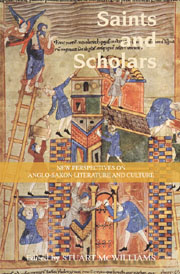 Saints and Scholars
Saints and Scholars Book contents
- Frontmatter
- Contents
- List of Contributors
- Abbreviations
- Introduction
- I Hagiography and the Homiletic Tradition
- II Aspects of Community and Consumption
- 8 Stories from the Court of King Alfred
- 9 De Duodecim Abusiuis, Lordship and Kingship in Anglo-Saxon England
- 10 Reluctant Appetites: Anglo-Saxon Attitudes towards Fasting
- 11 A Note on the Function of the Inscribed Strip from the Staffordshire Hoard
- 12 The Shining of the Sun in the Twelve Nights of Christmas
- 13 Sin and Laughter in Late Anglo-Saxon England: The Case of Old English (h)leahtor
- 14 Marginal Activity? Post-Conquest Old English Readers and their Notes
- III Reflections on Old English Scholarship
- Poems
- Hugh Magennis: A Bibliography, 1981–2011
- Index
- Tabula Gratulatoria
8 - Stories from the Court of King Alfred
from II - Aspects of Community and Consumption
Published online by Cambridge University Press: 05 February 2013
- Frontmatter
- Contents
- List of Contributors
- Abbreviations
- Introduction
- I Hagiography and the Homiletic Tradition
- II Aspects of Community and Consumption
- 8 Stories from the Court of King Alfred
- 9 De Duodecim Abusiuis, Lordship and Kingship in Anglo-Saxon England
- 10 Reluctant Appetites: Anglo-Saxon Attitudes towards Fasting
- 11 A Note on the Function of the Inscribed Strip from the Staffordshire Hoard
- 12 The Shining of the Sun in the Twelve Nights of Christmas
- 13 Sin and Laughter in Late Anglo-Saxon England: The Case of Old English (h)leahtor
- 14 Marginal Activity? Post-Conquest Old English Readers and their Notes
- III Reflections on Old English Scholarship
- Poems
- Hugh Magennis: A Bibliography, 1981–2011
- Index
- Tabula Gratulatoria
Summary
Three key Alfredian texts were issued in or around the year 893: Asser's Life of King Alfred, the Anglo-Saxon Chronicle, and the prose preface to the Old English Pastoral Care. Together the three texts provide extensive testimony about King Alfred as ruler, warleader, saint, scholar and educator, and from at least the twelfth century historians were combining those three texts and reconciling their differences in order to develop a comprehensive account of the king. But how much of this testimony is fact and how much myth or spin has always been difficult to tell. The Alfredian myth had begun already in the king's own lifetime, as Simon Keynes has pointed out, and it developed quickly in the succeeding century. In the attempt to reconcile the stories and establish a core of possible historical truth, it is easy to distort what the accounts actually say and to miss their particular narrative logic, their often highly creative and individual constructions of the king's life and achievements and their imaginative re-use of literary traditions. Asser's Life and Alfred's preface to the Pastoral Care both have much to say on the subject of education and scholarship, and there is a fair amount of common ground. Both have things to say about the king's own abilities and scholarship, about his concerns for the education of others, about his recruitment of foreign teachers, about the provision of schools, and about the availability of vernacular books.
- Type
- Chapter
- Information
- Saints and ScholarsNew Perspectives on Anglo-Saxon Literature and Culture in Honour of Hugh Magennis, pp. 123 - 140Publisher: Boydell & BrewerPrint publication year: 2012
